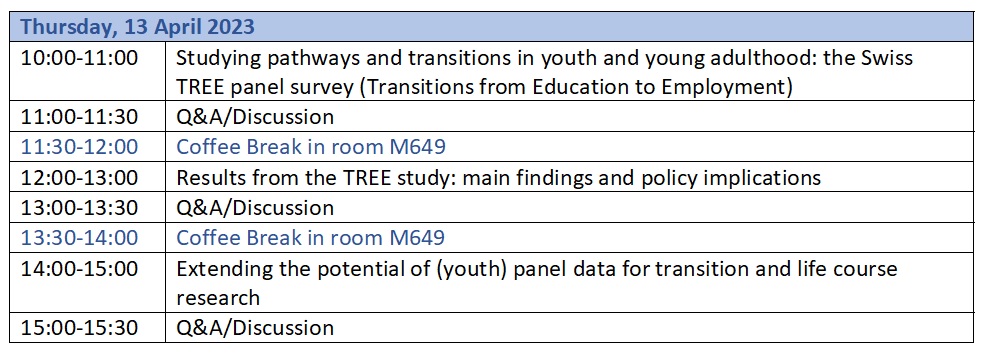YouthLife/IET Workshop on Longitudinal Study of Youth: A Swiss Multi-Cohort Study TREE - Transitions from Education to Employment
Add to calendar
iCal calendarThe purpose of the workshop is to share experiences from the preparation and implementation of a successful youth longitudinal study carried out in Switzerland over the last twenty years, based on the PISA sample. A research group led by Prof Ellu Saar at the Institute of International Social Studies at Tallinn University is currently planning and preparing the Estonian Longitudinal Study of Youth (ELSY) following a similar research design.
During the workshop, Dr Thomas Meyer and Dr Sandra Hupka-Brunner from the Institute of Sociology at the University of Bern will present the TREE project (Transitions from Education to Employment), a Swiss nationwide longitudinal study that follows two cohorts of compulsory school leavers throughout their transitions from education to employment and adulthood, which provides valuable insights for our own study.

Please register your participation no later than 05.04.2023 by following the link to the registration
form below:
Session I (10:00-11:30) - Studying pathways and transitions in youth and young adulthood: the Swiss TREE panel survey (Transitions from Education to Employment)
How do young people in Switzerland find their way into and through post-compulsory education and, later on, into professional and adult life? How do they fare on their pathways? Which plans, dreams and aspirations do they have? What difficulties do they encounter along the way? These are some of the central questions at the heart of the TREE study (Transitions from Education to Employment). TREE is a large panel survey following up on compulsory school leavers from all over Switzerland through their post-compulsory education and training and into employment and
adulthood. The first TREE cohort (TREE1) was launched in 2000, drawing on the Swiss sample of PISA (Programme for International Student Assessment; starting sample N=6.343). On average, the sample is about to reach the age of 40 and has been followed up by means of ten-panel waves spanning an observation period of over 20 years. 16 years after the launch of TREE1, TREE has been extended into a multi-cohort survey in 2016 by starting longitudinal observation of a second school leavers’ cohort (TREE2; starting sample N=8.429). The second TREE cohort is on average 23 years old and has been followed up by six-panel waves. Both TREE cohort surveys are ongoing. The presentation will cover the TREE study’s theoretical framework, its multi-disciplinary, multi- cohort study and survey design, its survey program, and its role and relevance as one of Switzerland’s most frequently used social science data infrastructures. The presentation will also address the scientific, economic and institutional challenges of setting and keeping up a large-scale panel survey over an extended period of time.
Session II (12:00-13:30) - Results from the TREE study: main findings and policy implications
Over the years, analyses of over 500 TREE data users have yielded more than 300 publications (for detail, see www.tree.unibe.ch/results). The large body of research covers a wide range of disciplines such as sociology, economy, psychology, educational sciences, etc. and an equally wide range of topics. Topical strands of TREE-based research include educational and labor market outcomes, equity and (in)equality, (educational) stratification and social mobility, the gendering of educational and labor market trajectories, migration issues, and differences between VET and general education with regard to educational and life-course opportunities. The presentation will give an overview of these major strands of research and their main results, including policy implications to be derived from them.
Session III (14:00-15:30) Extending the potential of (youth) panel data for transition and life course research
The third presentation will dwell on how the already high scientific and analytic potential of (youth) panel data can yet be extended by enriching them, on the one hand, through mixed-methods designs combining quantitative and qualitative research. We will present two examples of qualitative “add-on” studies implemented in the context of the TREE main study. The first investigates the gendering of educational aspirations and trajectories in its early stages, while the second focuses on the role of parental investment in their children’s education among socially disadvantaged families. On the other hand, we briefly explore the additional analytic gain of multi- cohort panel survey designs such as TREE’s and of combining survey data with further data sources (e.g., register/administrative data).
Presenters
Dr Thomas Meyer initiated the TREE study in the late 1990s and is co-directing it along with Sandra Hupka-Brunner. He is a sociologist of education with a research focus on educational inequality and institutional factors affecting educational opportunities, including their long-term effects on the life course (for more detail, see www.tree.unibe.ch/about_us/personen/dr_meyer_thomas ).
Dr Sandra Hupka-Brunner is co-directing the TREE study along with Thomas Meyer. Her fields of expertise are located between educational sciences and the sociology of education. Her research focus is on educational inequality, the gendering of educational and life course trajectories and educational careers and outcomes of young migrants (for more detail, see www.tree.unibe.ch/about_us/personen/dr_hupka_brunner_sandra ).
The workshop is organized by the TLU Center of Excellence in Interdisciplinary Life Studies (IET), funded by the European Union Regional Development Fund (ASTRA project "TLU TEE Tallinn University as a promoter of intelligent lifestyle") in cooperation with the consortium of YouthLife Project which has received funding from the European Union´s Horizon 2020 research and innovation programme under grant agreement No 952083.
